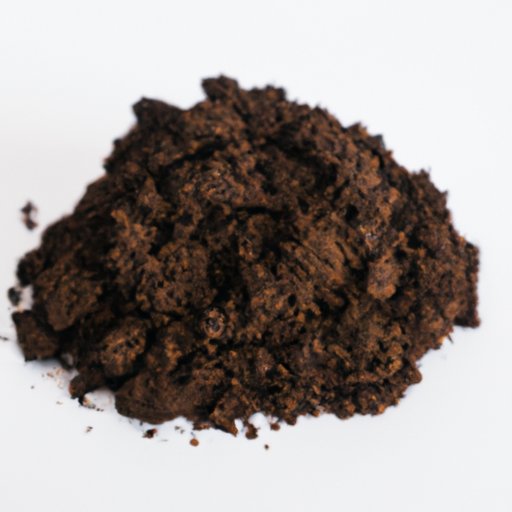
Introduction
Coffee is a staple for many people, providing them with the caffeine boost they need to start their day. However, did you know that coffee grounds also contain nutrients and antioxidants that could benefit your overall health? Despite this potential, many people are unsure if they can eat coffee grounds or if it is safe to do so. In this article, we will explore the health benefits and drawbacks of consuming coffee grounds, as well as unique ways to use them in cooking, cleaning, gardening, and myth-busting some harmful claims.
Health Benefits and Drawbacks of Consuming Coffee Grounds
Many people commonly associate coffee with the caffeine boost it provides, but coffee grounds also contain several nutrients and antioxidants, which are lost when the coffee is brewed. Coffee grounds are a good source of vitamin B3, B2, and minerals such as magnesium, potassium, and calcium. Additionally, antioxidants found in coffee grounds, such as chlorogenic acid, quinines, and polyphenols, play a role in reducing the risk of chronic diseases such as cancer, type 2 diabetes, and cardiovascular diseases.
While coffee grounds offer several potential health benefits, there are also risks associated with eating them. The primary concern is that coffee grounds contain a higher concentration of caffeine, which could lead to high caffeine intake. This overconsumption could lead to negative side effects such as increased heart rate, anxiety, and restlessness. Additionally, consuming coffee grounds could also cause gastrointestinal problems, including nausea, vomiting, and stomach upset.
In conclusion, while coffee grounds contain several nutrients and antioxidants that may be beneficial to one’s health, they are also associated with risks such as increased caffeine intake and gastrointestinal problems. Therefore, it is essential to consider these potential drawbacks before deciding to eat coffee grounds.
Unique Ways to Use Coffee Grounds Aside from Drinking
Besides the traditional use as a stimulating beverage, coffee grounds can also be repurposed for several different purposes. One of the most significant advantages of repurposing coffee grounds is that it is an environmentally friendly practice.
If you have been throwing away your coffee grounds, we recommend reusing them to minimize waste. You can use coffee grounds as a natural cleaner, exfoliator, or gardening fertilizer. For example, you can use them to clean hard-to-clean surfaces such as grills or the sticky residue that often collects at the bottom of your pots and pans. When used as exfoliators, coffee grounds can help improve the texture of your skin, leaving it smoother, softer, and brighter. Lastly, when used as a gardening fertilizer, coffee grounds provide essential nutrients such as nitrogen, potassium, and phosphorus to the soil.
Coffee Grounds in Cooking and Baking
Coffee grounds can add depth and complexity to savory dishes or intensify the sweetness of desserts such as tiramisu. When using coffee grounds in cooking and baking, it is essential to note that the strength of the coffee aroma and flavor varies depending on the type of coffee used and the brewing method.
One popular way to incorporate coffee grounds is in chili con carne or spicy wings. The bitterness of the coffee lends a unique flavor that counterbalances the spice in the dish. In baked goods, coffee grounds add a depth of flavor that enhances the taste of chocolate or nuts. For example, adding ground coffee to a brownie recipe would give the dessert an intense coffee flavor, lifting the chocolate to a whole new level.
Below are a couple of recipes to try using coffee grounds:
- Coffee-crusted Steak Recipe
- Coffee and Spice-rubbed Pork Tenderloin Recipe
- Coffee Brownies Recipe
Environmental Impact of Coffee Ground Disposal
Around the world, coffee is one of the most consumed beverages, which equates to the generation of millions of coffee grounds yearly. It’s essential to remember that throwing away used coffee grounds is harmful to the environment because they create large amounts of greenhouse gas. In landfill sites, coffee grounds can release methane, a potent greenhouse gas that contributes to global warming. However, they are biodegradable, meaning they break down into compost in a short period.
Sustainable Ways of Disposing of Coffee Grounds can help to minimize environmental impact. You can compost them at home in a compost bin or place them in a green bin, where they will be collected along with other organic waste. Top waste-management companies use composting as an alternative to landfill, which reduces the environmental impact of waste disposal and, at the same time, creates a nutrient-rich soil conditioner.
Myth-busting: Debunking Harmful Claims about Coffee Ground Consumption
We have heard many false claims about the health effects of consuming coffee grounds, such as the claim that eating coffee grounds can cause stroke or heart attack. According to various health sources, this is untrue. Another commonly-held belief is that eating coffee grounds can help with weight loss or suppress appetite. There is no scientific evidence to support this claim
The bottom line is that while coffee grounds contain nutrients and antioxidants, overconsumption can lead to negative effects on your health. Therefore, it’s essential to consume coffee in moderation and to consider its potential risks before eating coffee grounds.
Conclusion
In conclusion, coffee grounds offer several health benefits, including essential nutrients and antioxidants that can help prevent chronic diseases. However, it is crucial to consider their potential risks, including increased caffeine intake and gastrointestinal problems, before consuming them. Besides, there are unique ways to repurpose coffee grounds, including using them as a natural cleaner, exfoliator, or gardening soil fertilizer. Coffee grounds also add flavor and depth to savory dishes and sweet desserts when used in recipes. Sustainable disposal methods such as composting are essential to minimize the environmental impact of discarded coffee grounds. Lastly, it’s crucial to debunk the harmful and false claims about coffee ground consumption that falsely promise weight loss or other health benefits with no scientific backing.




